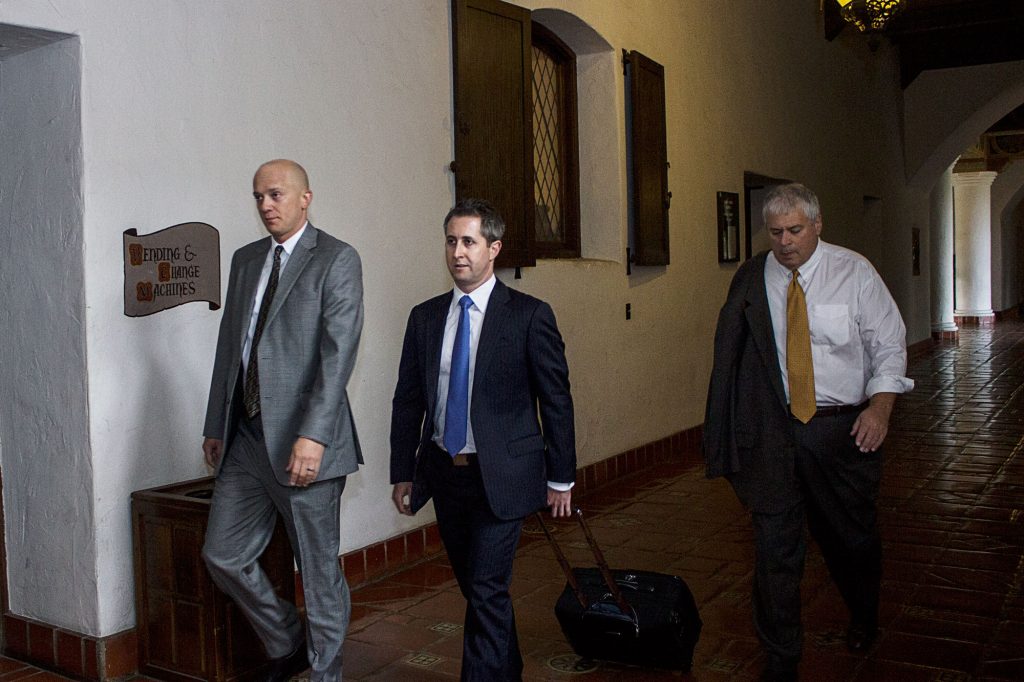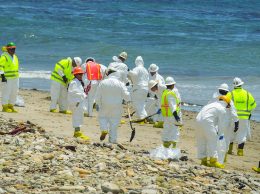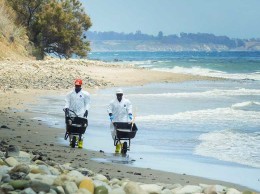Plains arraignment, motion to seal indictment transcripts continued to July 28
IN THIS ARTICLE
- Energy Topic
- pacbiztimes Author
By pacbiztimes Thursday, June 30th, 2016

James Buchanan, left, is Plains All American Pipeline’s environmental and regulatory compliance specialist pictured at the Santa Barbara Courthouse June 30. He was indicted along with Plains following the Refugio oil spill. (Alex Kacik)
The arraignment for Plains All American Pipeline and its employee James Buchanan along with the company’s motion to seal indictment transcripts was continued to July 28.
The Plains indictment that stems from the Refugio oil spill contains 46 counts, four of which are felonies. A federal investigation is ongoing.
Plains filed a motion on May 27 to seal all California grand jury proceedings, including all pleadings and exhibits until the trial is over. Plains claims that the transcript may impede a fair and impartial trial as well as violate the privacy rights of grand jury witnesses and “unindicted individuals.”
Judge Jean Dandona said at a June 30 hearing in Santa Barbara Superior Court that she needs to read the entirety of the transcript before making a ruling.
Dandona said she would go by statute 938.1 and the precedent set in the Alvarez case. The statute says that the transcript may be sealed if there’s a reasonable likelihood that its disclosure prejudices the right to a fair trial. The Alvarez case established that the public has a constitutional right to access judicial proceedings, but it is not absolute.
“The grand jury transcripts contain testimony and evidence that were highly one-sided and they were all hearsay,” said Plains attorney Susan Yu at the June 30 hearing, adding that the public may be analyzing what may or may not be admissible.
If the court decides to unseal the transcripts, Plains will appeal, Yu said.
The release of the transcripts will not cause a biased trial because potential jurors in Santa Barbara County and other potential venues are likely aware of the facts of the spill and it is not a “most extraordinary” case where the sealing is justified, according to the opposing motion filed by Keller Rohrback, Cappello & Noel and Lieff Cabraser Heimann & Bernstein.
“This is a case where the public interest in public records far outweighs any imagined prejudice to the defendant,” says the motion from the law firms, which are representing plaintiffs in a consolidated class action lawsuit against Plains.
The felony charges include discharging oil into state and federal waters in violation of the Clean Water Act, knowingly causing a hazardous substance to spill on any road, street, highway or railroad, and knowingly making false or misleading reports following the spill.
Plains and Buchanan are also on the hook for a failure to notify proper authorities in a timely manner. Buchanan is not charged with any felonies and faces a maximum jail sentence of three years.
Plains and Buchanan knowingly failed to immediately notify the California Office of Emergency Services and failed to call the National Response Center within an hour after the spill, according to the indictment.
Prosecutors estimated that Plains will pay between $1 million and $2.8 million in fines plus additional penalties and costs. Cleanup costs have totaled $150 million thus far, said Plains, estimating that the environmental disaster would cost about $269 million in its annual report. The company expects insurance to cover $186 million of those costs.
• Contact Alex Kacik at [email protected].












